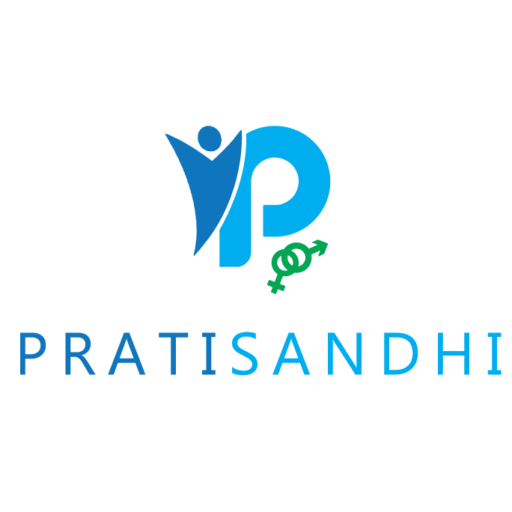LGBTQ- ‘B’ for Biphobia?
By – Tanisha Saxena
LGBTQ+ Glossary
The LGBTQ+ community is an important and vibrant part of our society. It is thus important to know the different gender identities that comprise it and common terms related to them. Here are a few-
Asexual | The lack of a sexual attraction or desire for other people
Bisexual | A person emotionally, romantically or sexually attracted to more than one sex, gender or gender identity though not necessarily simultaneously, in the same way or to the same degree.
Drag Queen/Drag King | People who present socially in clothing, name, and/or pronouns that differ from their everyday gender-usually for enjoyment, entertainment, and/or self-expression.
Gay | A person who is emotionally, romantically, or sexually attracted to members of the same gender.
Gender-fluid | According to the Oxford English Dictionary, a person who does not identify with a single fixed gender; of or relating to a person having or expressing a fluid or unfixed gender identity.
Gender non-conforming | A broad term referring to people who do not behave in a way that conforms to the traditional expectations of their gender, or whose gender expression does not fit neatly into a category.
Intersex | People who naturally (without any medical interventions) develop primary and/or secondary sex characteristics that do not fit neatly into society’s definitions of male or female.
Lesbian | A woman who is emotionally, romantically, or sexually attracted to other women.
Non-binary | An adjective describing a person who does not identify exclusively as a man or a woman. Non-binary people may identify as being both a man and a woman, somewhere in between, or as falling completely outside these categories. While many also identify as transgender, not all non-binary people do.
Pansexual | Not limited in sexual choice regarding biological sex, gender, or gender identity.
Queer | A term people often use to express fluid identities and orientations. Often used interchangeably with “LGBTQ.”
Transgender | An umbrella term for people whose gender identity and/or expression is different from cultural expectations based on the sex they were assigned at birth. Being transgender does not imply any specific sexual orientation. Therefore, transgender people may identify as straight, gay, lesbian, bisexual, etc.
Fun fact- The rainbow flag represents the LGBTQ community as a whole while most identities have a separate flag of their own.
The bisexual flag- is derived from an earlier symbol for bisexuality- the “biangles”- two overlapping blue and pink triangles. This color scheme has become so associated with the bi community that queer film and TV critics have dubbed such pink, purple and blue overhead lights as “bisexual lighting.”
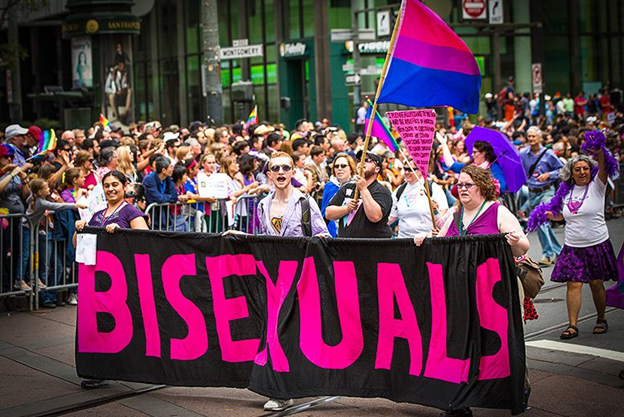
Bisexuality and Biphobia
A bisexual is someone emotionally, romantically, or sexually attracted to more than one sex, gender or gender identity though not necessarily simultaneously, in the same way or to the same degree.
The Association of LGBTQ Journalists, also known as the NLGJA, defines biphobia as “fear, hatred or dislike of bisexuality or bisexuals. May be harbored by lesbians, gays and transgender people as well as heterosexuals.” The key point to note is that biphobia occurs both within and outside of the LGBTQ community. This is primarily one of the reasons as to why this term is considered distinct from homophobia.
According to HRC Foundation’s research, studies suggest that nearly 50 percent of people who come out as queer, identify as bisexual. This makes the bisexual population the single largest group within the LGBTQ community. It is hence unfortunate that such a sizeable group is discriminated against.
Reports from HRC Foundation have observed that
- Bisexual individuals suffer significantly higher rates of depression and anxiety, sexual assault and poverty than lesbians, gay men or straight people
- Bi+ youth are far less likely to be out about their identities to people in their lives — including family and loved ones as compared to other LGBTQ members
68% of bi+ youth report being teased or treated poorly because of their sexual orientation and are often excluded from queer spaces.
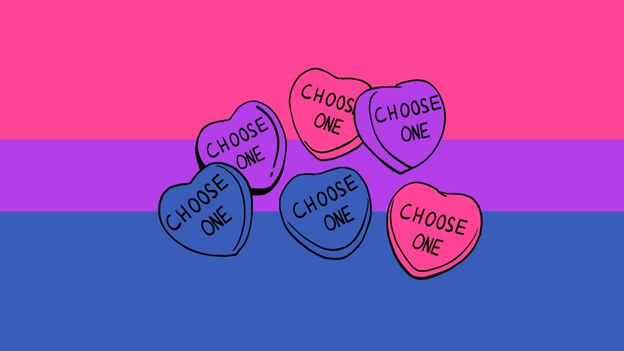
Being Bisexual in India
In a country where identifying as queer itself is still looked down upon, bisexuals have an even tougher time. Several myths of bis being greedy, confused and disloyal are bandied about freely.
Rico* who wishes to stay anonymous shares her experience; “I’m a bisexual person who is more inclined towards women (and it took me a long period of time to conform to this label). I began telling people about my queerness in the first year of college. I came out to a friend with whom I shared a relationship of discussing our romantic interests. I told her how I dated a boy after dating a girl and that I am currently dating a girl again. To my surprise, she suddenly ended up saying, ” Tu maan ya mat maan, Tu lesbian hi hai.” (It does not matter if you believe it or not, I know you are a lesbian) My dislike for her grew and after a while, I managed to cut ties with her.
If I tell you this is my identity, you take me for it. I did not ask you to chip in your two cents. Even if just one percent of me is interested in another gender, you still cannot question my sexuality until the point I choose for myself to go by a new label.”
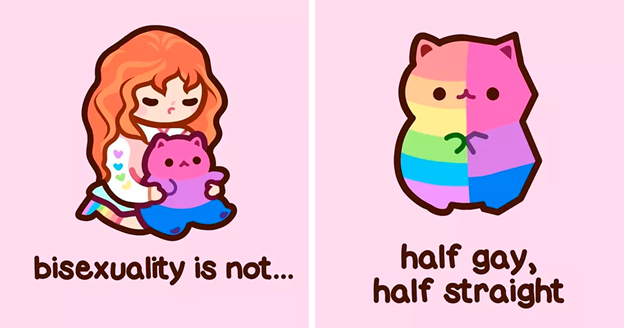
A reason as to why bisexual people tend to be rendered invisible is because they are clubbed into either being gay or straight. A bisexual person who is with someone of the same gender is assumed to be a gay/lesbian couple while a bisexual with an opposite gender is mistook for a straight couple or simply friends. Transgender bisexual people face another level of stigmatization. A bisexual trans male in a gay relationship is assumed to be straight due to their previous body. This further perpetuates the stereotype of being told to “pick a side”.
Bisexual women face yet another issue of being considered ‘open’ for threesomes on dating sites. Several couples run joint accounts in the search of bisexual women as a means to “spice up” their relationship. “So, does that mean you’d be interested in a threesome?” is a more typical response to bisexuals coming out than honest support. While bisexual women are over exposed due to fetishes, bisexual men are considered en-route a journey to coming out as gay.
“I think the discrimination probably stems out of the fact that bisexuality is “convenient”. I also think that most people somehow overlook the fact that growing up as a bisexual person is really confusing and difficult. Society generally only thinks of the gays as those who have had a difficult time figuring themselves out.
I can tell you that growing up as a bisexual was really confusing. I am not an active member of any of the LGBTQ+ groups, I have heard from people that they are not as accepting as they claim. I am not sure how much of it is true, but this could be one of the reasons too” opines Chhavi Joshi, an Instagram content creator.
The lack of respect and acceptance regarding people identifying themselves as bisexuals is the major issue. The genders they choose to date or the body they were born with is not what categorizes them. The only thing that does is the identity they choose to stand by.
“It all comes with the understanding that I told you I am this, then this is what I am. Your opinion of my sexuality based on the people I date doesn’t change what I feel on the inside.” – Rico
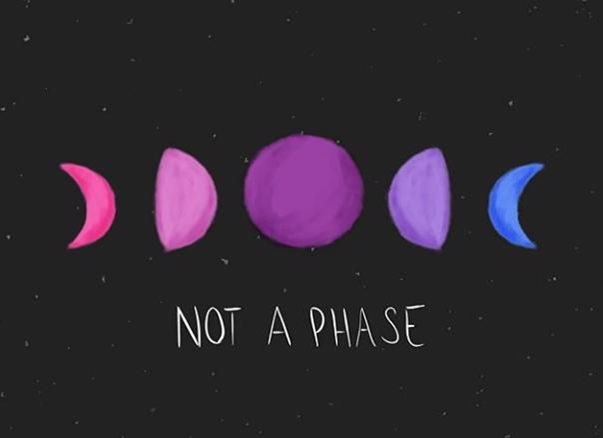
Bye bi erasure
It is important for society to realize that the “bi” in bisexuality does not refer to “men” and “women” as genders. It stands for – “own” and “other”, with the “other” as an umbrella term for all genders other than one’s own.
More LGBTQ organizations need to offer bi-specific services that can help relieve their anxiety due to lack of social acceptance. We need to be better at teaching and debunking stereotypes regarding bisexuality. Mass awareness and education will be key in the transformation.
Respect someone’s identity and take their word for it instead of your own perception of their sexuality. More support groups like the Bi Collective Delhi need to come up to create safer spaces for bisexuals.
To fully accept the LGBTQ society, we must also fully accept the bisexual community.
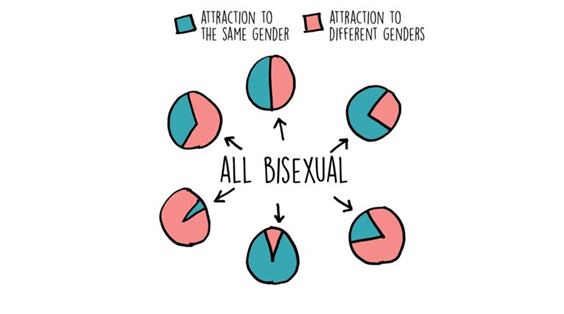
Author
